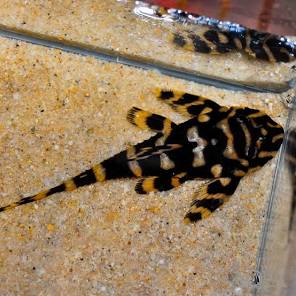Midwest Aquarium and Pond Supplier LLC
(13) L168 Butterfly Pleco 3''
(13) L168 Butterfly Pleco 3''
Precio habitual
$40.00 USD
Precio habitual
Precio de oferta
$40.00 USD
Los gastos de envío se calculan en la pantalla de pago.
Cantidad
No se pudo cargar la disponibilidad de retiro
The L168 butterfly pleco (Dekeyseria brachyura) is a visually striking and moderately sized freshwater catfish from the rivers of South America. Known for its remarkable camouflage, it can change its coloration from nearly black to a striped pattern depending on the substrate. It is also known as the Chameleon Pleco or Butterfly Peckoltia
Tank setup
- Tank size: A minimum of 30 gallons is recommended for a single adult. A community tank should be 50 gallons or more to provide ample space.
- Substrate: Sand or fine gravel is ideal, as the pleco enjoys foraging and occasionally burrowing.
- Decorations: Provide plenty of hiding spots with driftwood, caves, rocks, and live plants. Driftwood is particularly important, as the pleco will rasp on it for fiber.
- Lighting: Provide moderate, subdued lighting. Floating plants are a great way to create shaded areas that mimic their natural habitat.
- Filtration: A strong filter with moderate to high water flow and excellent oxygenation is essential, as the L168 pleco comes from fast-flowing river environments.
Water parameters
- Temperature: Maintain a stable temperature between 75°–82°F (24°–28°C).
- pH: The ideal range is slightly acidic to neutral, between 6.0 and 7.5.
- Water quality: Like many plecos, the L168 is sensitive to poor water quality. Regular, partial water changes are necessary to keep nitrates low.
Diet
- Omnivorous: The L168 is primarily herbivorous, grazing on algae and biofilm.
- Supplementation: A varied diet is crucial for proper health. Offer high-quality sinking wafers, algae tablets, blanched vegetables (zucchini, cucumber, spinach), and occasional protein-rich foods (bloodworms, brine shrimp, shrimp pellets).
- Feeding schedule: As they are nocturnal, it is best to feed them after the lights are out to ensure they get enough food.
Behavior and tank mates
- Temperament: Generally peaceful, though they can be territorial with their own species or other bottom-dwellers, especially in smaller tanks. Provide ample hiding spots to minimize conflict.
- Compatibility: Good tank mates include peaceful, non-aggressive community fish such as tetras, rasboras, corydoras, and dwarf cichlids. Avoid large or overly aggressive species.
- Activity: Mostly nocturnal and shy, the pleco will spend much of the day resting in its hiding spots.
Breeding
- Process: Breeding has been achieved in the hobby, but it can be challenging. The male will select and guard a cave where the female lays her eggs.
- Trigger: Spawning can sometimes be induced by performing large water changes with cooler water, simulating the rainy season in their natural habitat
Share
No reviews

